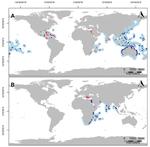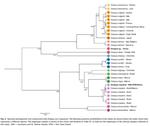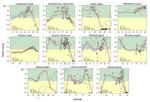Publications
Climate change effect on Octopus maya (Voss and Solís-Ramírez, 1966) suitability and distribution in the Yucatan Peninsula, Gulf of Mexico; A correlative and mechanistic approach
Fisheries play critical roles in food supply and income for human communities worldwide. Unfortunately, the fishery distribution have been changing …
Temperature modulates spatio-temporal variability of the functional reproductive maturation of Octopus maya (Cephalopoda) on the shelf of the Yucatan Peninsula, Mexico
Laboratory studies have demonstrated that high temperatures inhibit spawning of Octopus maya; therefore, in oceanic warming scenarios the population …




